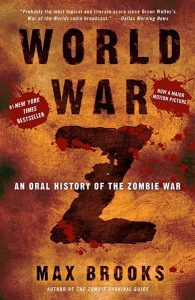For some unclear reason, I had a craving to read a book with somewhat of an apocalyptic vibe, maybe even something with a worldwide pandemic that is changing the face of humanity. But you know, not just any plague, but one that leaves piles of bodies lying on the streets, and while we’re at it, maybe ones that resurrected and attacked the living.
In other words, I wanted to read a good zombie book. Emphasizing the words “zombies” and “good” because there aren’t many that combine the two. Or at least not many that I’ve encountered with (except for the amazing “The Girl with All The Gifts“). But then I remembered a very warm recommendation I got more than ten years ago for “World War Z.”
If you are clicking your tongue because you’ve seen the Brad Pitt movie, you should probably stop because the clicking sound might attract the walking dead, and the last thing you want to deal with right now is a mob of dead bodies trying to eat you. Yes, the movie does have the same name as the book, but comparing the two would be similar to comparing the Mona Lisa to a copy painted by a half-blind and not particularly talented caricature artist on the banks of the Seine. Don’t get me wrong, it is a fun-to-watch film, but any relation from it to quality is a coincidence, while the book… Wow, what a book.
As I’ve already mentioned, if you’ve seen the movie, you should forget everything you’ve seen, first and foremost from Brad Pitt. The only protagonist of this book, who accompanies the plot from start to finish is the formidable virus that turns most of humanity into voracious, brainless monsters. This is because “World War Z” consists of a series of testimonies gathered by the writer ten years after the great war against zombies ended. Small personal stories of those who were there and survived to see another day, alongside tales of heroism larger than reality, the horrors endured by the survivors, and other atrocities they had to commit to reaching the day after. These stories, reported in first person, are told in chronological order – starting from the family doctor who first encountered the virus in one of the remote provinces of China, to humanity’s great war for survival –and demonstrates literary and stylistic depths and a rare understanding of the human race that you would not expect from just another zombie book.
Despite the horror that hides in it, “World War Z” is not a very scary book. At least not in the classic sense of the genre. It does have moments of horror that will destabilize the most experienced reader, moments that will make you jump in panic at the sound of small noises at home or shrink into a fetal position and hide under a blanket, but before it is a horror book “World War Z” is a speculative literature masterpiece.
It’s been a long time since I’ve read a book that manages to dive so deeply, and so accurately, into the question “What would have happened if?” that should accompany any self-respecting science fiction book. What would happen if men left to colonize Mars? What if we invented a bracelet that lets us switch bodies with someone else? What would happen if we would discover a virus that causes the dead to rise and become cannibal monsters? Truly enough, it’s not the first zombie book written (not even the first written by Max Brooks). Still, its full devotion to the thesis is what separates it, in my opinion, from a mediocre and somewhat banal science fiction book and a perfect one. The world it presents is so full and round and authentic that the reader has nothing left to do but to wear a protective suit against zombies, grab the nearest weapon, and get himself ready for battle. Brooks demonstrates a broad understanding, not only of the human race but also of the different cultures in it, while describing the course of events through the eyes of the different story-tellers. What is certain is that if we ever have to deal with a real zombie apocalypse, do the human race a favor and let him manage the war on it because there seems to be no possible scenario he has not thought of already.
And a few words about zombie epidemics in general before we are done here for the day. By looking at the raw data, zombies are pretty lame monsters. They have no intelligence or sophistication, they do not chase their prey quickly, but instead, follow it slowly, and they might step beyond a cliff like the miserable Lemmings in Disney’s 1958 fake nature film. Why are we so afraid of creatures that all you need to avoid them is light run and access to high places? The chances are that’s not what George Romero had in mind when he made the film “Night of the Living Dead,” which pretty much invented the rules of the genre, but in our day and age, a zombie outbreak can be the best visualization to the way a pandemic can spread worldwide. In this case, however, it is not an innocent cough that seeds deadly viruses in the bodies of the others but turns de facto into a monster that spread the disease as it actively tries to devour humankind.
In conclusion, if it wasn’t clear enough from everything I’ve written so far, it is a great book, not just for fans of the genre.
Five growls and one blood-curdling scream
World War Z / Max Brooks / Crown Publishing Group








